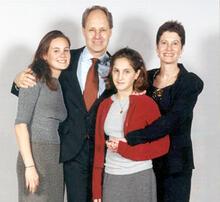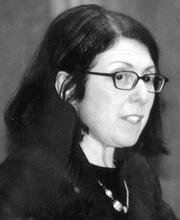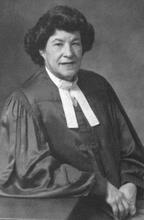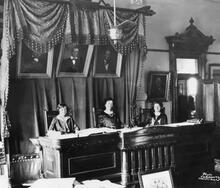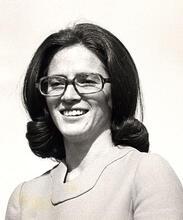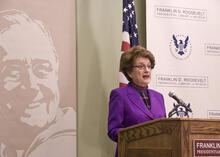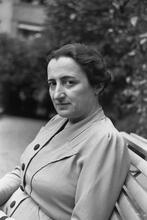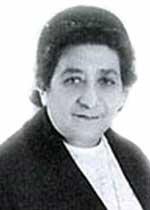Phyllis A. Kravitch
Phyllis A. Kravitch became the third woman circuit court judge in the United States in 1979 and served her home state of Georgia for decades. The daughter of an attorney, Kravitch joined her father in a law practice that focused on defending poor people and minorities in Savannah. One of the first female trial lawyers in the South, she became the first woman president of the Savannah Bar Association in 1973 and went on to serve as the first woman superior court judge in Georgia. Once appointed to the circuit court, she established a rape crisis center and shelter for women survivors of domestic violence. She also served on the Chatham County Board of Education, ensuring equal salaries for teachers regardless of race or gender.
Appointed to the United States Court of Appeals by President Jimmy Carter in 1979, Phyllis A. Kravitch was the third woman to become a United States circuit judge. When her alma mater, the University of Pennsylvania Law School, presented her with the James Wilson Award for service to the legal profession in 1992, Kravitch in her acceptance speech attributed her professional accomplishments to her father, attorney Aaron Kravitch. Not only did the daughter follow in the footsteps of her father at the University of Pennsylvania, but after her graduation in 1943, she joined him in a law practice devoted to the protection of individual rights, especially those of poor people and minorities. In her hometown of Savannah, Georgia, Kravitch prevailed against gender and religious discrimination then prevalent in the Deep South.
Early Life and Family
Phyllis Kravitch was born on August 23, 1920, the second of four daughters of Aaron and Ella (Wiseman) Kravitch. With a blend of American Jewish heritages on both sides of her family, she became a lifelong member of the Mickve Israel Congregation in historic Savannah, where she was confirmed in 1935. From her mother and maternal grandmother, Kravitch learned to appreciate music, dance, and art. Her maternal grandmother, an unusual woman, had been valedictorian of her class and, before her marriage, a schoolteacher.
Groundbreaking Legal Career
Described as “never one to be strapped by convention,” Kravitch was one of the first woman trial lawyers in the South, beginning her career before women were even allowed to sit on juries in Georgia. She was also the first woman president of the Savannah Bar Association (1973), the first woman superior court judge in Georgia, and the first woman judge on the Fifth Circuit (later divided into the Eleventh Circuit) Court of Appeals. In the Senate hearing confirming her appointment, Senator Edward Kennedy called Kravitch “courageous.” A poll by the American Association of University Women of Savannah selected her as “Savannah’s Most Influential Woman.” She has received numerous honors, including an honorary doctor of laws from her undergraduate alma mater, Goucher College, in 1981; the American Bar Association’s Margaret Brent Woman Lawyers of Achievement Award in 1991; and the National Council of Jewish Women’s Hannah G. Solomon Award in 1978. In 1996, she attained senior status on the 11th Circuit Court of Appeals.
A Life of Service
Kravitch devoted her life to myriad scholastic, civic, and professional activities. Prior to ascending to the federal bench, she was active in establishing a family shelter for women survivors of domestic violence and a rape crisis center in Savannah, and she also assisted the Georgia legislature in revising family, juvenile, and child abuse laws. As a member of the Chatham County Board of Education (1949 to 1955), she was instrumental in eliminating sex- and race-based salary discrepancies and the use of substandard school buildings.
Throughout her career, Kravitch served on the standing committee on the rules of practice and procedure of the Judicial Conference of the United States, the law school council of Emory University School of Law, the Truman Scholars selection committee (southeast region), and the Board of Visitors, Georgia State University Law School. She was also a member of the visiting committee of the University of Chicago Law School, the selection committee of the Rhodes Scholarships, the White House fellowship committee, the American Bar Association, the American Law Institute, and other organizations.
Phyllis Kravitch died on June 15, 2017, at the age of 96. Maintaining her lifelong commitment to the law, she served on the 11th Circuit Court of Appeals until 2015 and handled a full caseload into her late 80s. Throughout her career, she broke down barriers in the Southern legal system as a Jew and as a woman.
“Award of the Margaret Brent Woman Lawyers of Achievement Award.” ABA Journal (August 11, 1991).
“Battler for Civil Rights: ‘Miz’ Phyllis Kravitch Vows to Be a Fair Judge.”Atlanta Journal, March 22, 1979.
“‘Courageous’ Attorney Joins U.S. Court.” Times-Picayune, May 29, 1979, sec. 4, p. 2.
Democratic Women of DeKalb News 1, no. 2 (June 1979).
Democratic Party of Georgia Newsletter 2 (June/July 1979).
“Judge Kravitch to Take Senior Status.” Fulton County Daily Report (November 19, 1996).
Kravitch, Phyllis A. Oral interview by author, October 12, 1996.
“‘Little Judge’ Again Makes History.”Atlanta Journal-Constitution, April 1, 1979, 12B.
“Noteworthy Rulings.” Almanac of the Federal Judiciary 2 (1996).
Southern Jewish Weekly, April 1979, p. 24.
“Symposium.” Penn Law Journal (February 1993).
“Tribute to Judge Phyllis A. Kravitch.” Georgia State University Law Review (February 1997).

